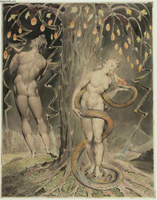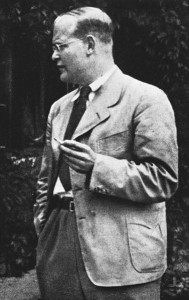 In this four-part series, I aim to think about one particular aspect of language: naming. In the introduction, I preliminarily addressed the root of the problem, the Fall. In this post I want to dive deeper into the original ‘scene of the crime’ for clues toward the character of the relationship between language and naming.
In this four-part series, I aim to think about one particular aspect of language: naming. In the introduction, I preliminarily addressed the root of the problem, the Fall. In this post I want to dive deeper into the original ‘scene of the crime’ for clues toward the character of the relationship between language and naming.
I suggested in that earlier post what we gained from the Fall—the knowledge of good and evil—is that which has affected language, that which has turned naming into overnaming.
If indeed we overname any time we name, if indeed we always already perform malediction with our benediction, it requires us to rethink this knowledge of good and evil. It is not merely a fact and good and evil are not just ‘things’ we know. They instead affect what we name when we claim to know them.
Most importantly, the naming of these two is at the heart of the ‘scene of the crime’ for overnaming.
The basic facts of Genesis 3 are known: a rule about a tree, a talking serpent, an offer, the sin, and the rest of it all.
It is important to acknowledge that the knowledge of good and evil has been traditionally understood as a moral knowledge. The first humans longed to know more than they should have about good and evil, longed to know like God. This was their prideful error, the original sin. [It is important to point out there that implying God knows evil isn’t to suggest, of course, he is that.]
But here is a problem with that understanding: they weren’t offered that by the serpent. Read it again.
“Did God really say ‘You must not eat from any tree in the garden?’”
They were not offered moral knowledge, as if the fruit of that tree had vitamins called good and evil. The serpent didn’t paint a persuasive picture of knowing good and evil, how that knowledge would enhance life in the garden.
Instead, it asked a question about what God had said. What was offered was a different kind of naming. The form of the offer—a question—shows us that what was offered was not some ‘thing’ or ‘object of knowledge’ but another way of being with God.

Dietrich Bonhoeffer gave a series of lectures on Genesis and he noted the serpent’s offer was a “pious possibility” of being more for God.
Eve does indeed exaggerate the rule. That isn’t the sin. It is when she and Adam see the tree anew. They rename it, overname it and so they eat. They see it in a new light—in the light of getting them closer to God. It is then seen not as a mysterious temptation (there wasn’t that in Eden), but something known, something of definite need. Something they know and so want.
Bonhoeffer noted that once the conversation between Eve and the serpent turned toward her (and Adam) eye-balling that fruit, humans started to live from their own “resources,” creating their own life, becoming their own creator. They became “like God” in how they name.
Bonhoeffer says: “From now on, no human assertion can be made about human beings that fails to bear in mind, and to take into specific account, their being” like God (Creation and Fall 116). No account of what happened in Genesis 3 can forget how such accounting itself —how language as such, language as naming—is now “like God.”
It is not that we were offered the knowledge of good and evil like an object, like a series of facts, two facts essentially. It is that we were offered a way to name like God. He names without divergence, no difference, no ‘space’ between the ‘thing’ named and the word used as name. He can do this because he is sovereign and has an all-encompassing knowledge. We don’t, obviously. But we name like we do.
Thought of this way, the knowledge of good and evil—which was once read by some commentators as ‘knowledge of everything in general’—becomes the ‘way’ we separate ourselves from God. We never gained this knowledge, specifically or generally at the Fall. We instead changed our relationship with naming.
Bonhoeffer notes the serpent “opens the eyes of the human being to a depth of which the human being has until now been unaware, a depth from which one would be in a position to establish or to dispute whether a word is God’s word or not.” (106)
Here then is an untraditional understanding of the Fall and its central knowledge: It is not a set of facts or knowing good and evil as concepts that mandated a ban from the garden. Instead, we were banned because of the naming power we claimed. We claim to name like God, to dispute whether a word is God’s word or not. This disputative power came from a new way of naming.
With this power, we believe the divide between good and evil appears in an obvious manner. Every time, even when we don’t say it. If we can just get past or eliminate whatever keeps us from that true name, that pure knowledge. In other words, we believe we can ‘account for’—give a clear, distinct, and uncompromising account—what is good and what is evil. We know—and know good and evil.
Or more profoundly, if one speaks morally, one is speaking not so much like God but for the divine, as the divine.
Now, you may object at this point. How we can speak truth if we can’t speak morally? How can we call out sin if we can’t name good and evil?
British philosopher John Llewelyn in The Rigor of a Certain Inhumanity notes “fallen” language “does not mean that we cannot mean what we say. It means that we are always, necessarily, not accidentally, liable to say more than we mean or otherwise other than we mean” (55).
Furthermore, when we overname, we are suggesting we have a standard outside language, outside us, to back up our assertions. Some of you may assume this standard is the name of God. But because of the Fall, because of the effect of the “knowledge of good and evil” on language, this standard is not God. Instead the standard we implicitly use is a neutral, uncorrupted language. Words and names aren’t corrupted, only we are. So we think. We suggest words ‘hold’ what we name in totality. Or they are what we name them. That is pride to some theologians.
That is some power. It is a myth. Our belief in it is also our central problem.
In a third post, I want to suggest what some ways we might address this problem. A fourth post will try to picture how these ways of addressing it might be practiced in the academy.
Matthew Boedy is an assistant professor of rhetoric and composition at the University of North Georgia. He has degrees from the University of Florida (BS) and the University of South Carolina (MFA and PhD). He enjoys books by Thomas Merton, Henri Nouwen, and Frederick Buechner. His research interests include the rhetoric of evil, ethics, and professional writing.

Leave a Reply